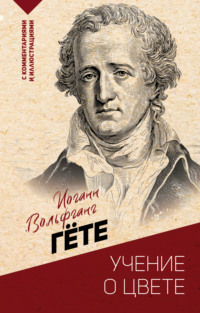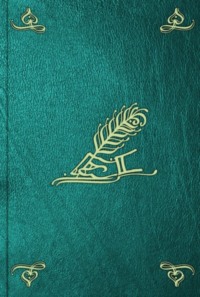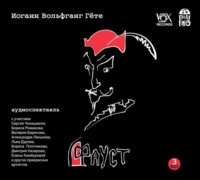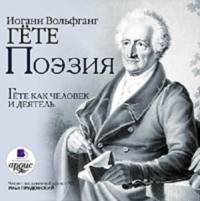 полная версия
полная версияLetters from Switzerland and Travels in Italy
Rome, Feb. 2, 1787.
Rome – The Coliseum
Of the beauty of a walk through Rome by moonlight it is impossible to form a conception, without having witnessed it. All single objects are swallowed up by the great masses of light and shade, and nothing but grand and general outlines present themselves to the eye. For three several days we have enjoyed to the full the brightest and most glorious of nights. Peculiarly beautiful at such a time is the Coliseum. At night it is always closed; a hermit dwells in a little shrine within its range, and beggars of all kinds nestle beneath its crumbling arches: the latter had lit a fire on the arena, and a gentle wind bore down the smoke to the ground, so that the lower portion of the ruins was quite hid by it, while above the vast walls stood out in deeper darkness before the eye. As we stopped at the gate to contemplate the scene through the iron gratings, the moon shone brightly in the heavens above. Presently the smoke found its way up the sides, and through every chink and opening, while the moon lit it up like a cloud. The sight was exceedingly glorious. In such a light one ought also to see the Pantheon, the Capitol, the Portico of St. Peter's, and the other grand streets and squares: – and thus sun and moon, like the human mind, have quite a different work to do here from elsewhere, where the vastest and yet the most elegant of masses present themselves to their rays.
Rome, Feb. 13, 1787.
I must mention a trifling fall of luck, even though it is but a little one. However, all luck, whether great or little, is of one kind, and always brings a joy with it. Near the Trinità de' Monte the ground has been lately dug up to form a foundation for the new Obelisk, and now the whole of this region is choked up with the ruins of the Gardens of Lucullus, which subsequently became the property of the Emperors. My perruquier was passing early one morning by the spot, and found in the pile of earth a flat piece of burnt clay, with some figures on it. Having washed it, he showed it to me. I eagerly secured the treasure. It is not quite a hand long, and seems to have been part of the stem of a great key. Two old men stand before an altar; they are of the most beautiful workmanship, and I am uncommonly delighted with my new acquisition. Were they on a cameo, one would greatly like to use it as a seal.
I have by me a collection also of many other objects, and none is worthless or unmeaning, – for that is impossible; here everything is instructive and significant. But my dearest treasure, however, is even that which I carry with me in my soul, and which, every growing, is capable of a still greater growth.
Rome, Feb. 15, 1787.
Before departing for Naples, I could not get off from another public reading of my "Iphigenia." Madam Angelica and Hofrath Reiffenstein were the auditory, and even Signor Zucchi had solicited to be present, because it was the wish of his spouse. While it was reading, however, he worked away at a great architectural plan – for he is very skilful in executing drawings of this kind, and especially the decorative parts. He went with Clerisseau to Dalmatia, and was the associate of all his labours, drawing the buildings and ruins for the plates, which the latter published. In this occupation he learned so much of perspective and effect, that in his old days he is able to amuse himself on paper in a very rational manner.
The tender soul of Angelica listened to the piece with incredible profoundness of sympathy. She promised me a drawing of one of the scenes, which I am to keep in remembrance of her. And now, just as I am about to quit Rome, I begin to feel myself tenderly attached to these kindhearted people. It is a source of mingled feelings of pleasure and regret to know that people are sorry to part with you.
Rome, Feb. 16, 1787.
The safe arrival of "Iphigenia" has been announced to me in a most cheering and agreeable way. On my way to the Opera, a letter from a well-known hand was brought to me, – this time doubly welcome; since it was sealed with the "Lion" a premonitory token of the safe arrival of my packet. I hurried into the Opera-house, and bustled to get a place among the strange faces beneath the great chandelier. At this moment I felt myself drawn so close to my friends, that I could almost have sprung forward to embrace them. From my heart I thank you even for having simply mentioned the arrival of the "Iphigenia," may your next be accompanied with a few kind words of approval.
Inclosed is the list of those among whom I wish the copies which I am to expect from Gösche to be distributed; for although it is with me a perfect matter of indifference how the public may receive these matters, still I hope by them to furnish slight gratification to my friends at least.
One undertakes too much. When I think on my last four volumes together, I become almost giddy – I am obliged to think of them separately, and then the fit passes off.
Rome – "Iphigenia" – "Tasso."
I should perhaps have done better had I kept my first resolution to send these things one by one into the world, and so undertake with fresh vigour and courage the new subjects which have most recently awakened my sympathy. Should I not, perhaps, do better were I to write the "Iphigenia at Delphi," instead of amusing myself with my fanciful sketches of "Tasso." However, I have bestowed upon the latter too much of my thoughts to give it up, and let it fall to the ground.
I am sitting in the ante-room near the chimney, and the warmth of a fire, for once well fed, gives me courage to commence a fresh sheet, for it is indeed a glorious thing to be able, with our newest thoughts, to reach into the distance, and by words to convey thither an idea of one's immediate state and circumstances. The weather is right glorious, the days are sensibly lengthening, the laurels and box are in blossom, as also are the almond-trees. Early this morning I was delighted with a strange sight; I saw in the distance tall, pole-like trees, covered over and over with the loveliest violet flowers. On a closer examination I found it was the plant known in our hothouses as the Judas-tree, and to botanists as the "cercis siliquastrum." Its papilionaceous violet blossoms are produced directly from out of the stem. The stakes which I saw had been lopped last winter, and out of their bark well-shaped and deeply-tinted flowers were bursting by thousands. The daisies are also springing out of the ground as thick as ants; the crocus and the pheasant's eye are more rare, but even on this account more rich and ornamental.
What pleasures and what lessons will not the more southern land impart to me, and what new results will arise to me from them! With the things of nature it is as with those of art; much as is written about them, every one who sees them forms them into new combinations for himself.
When I think of Naples, and indeed of Sicily, – when I read their history, or look at views of them, it strikes me as singular that it should be even in these paradises of the world that the volcanic mountains manifest themselves so violently, for thousands of years alarming and confounding their inhabitants.
But I willingly drive out of my head the expectation of these much-prized scenes, in order that they may not lessen my enjoyment of the capital of the whole world before I leave it.
For the last fourteen days I have been moving about from morning to night; I am raking up everything I have not yet seen. I am also viewing for a second or even a third time all the most important objects, and they are all arranging themselves in tolerable order within my mind: for while the chief objects are taking their right places, there is space and room between them for many a less important one. My enthusiasm is purifying itself, and becoming more decided, and now at last my mind can rise to the height of the greatest and purest creations of art with calm admiration.
In my situation one is tempted to envy the artist who, by copies and imitations of some kind or other can, as it were, come near to those great conceptions, and can grasp them better than one who merely looks at and reflects upon them. In the end, however, every one feels he must do his best; and so I set all the sails of my intellect, in the hope of getting round this coast.
The stove is at present thoroughly warm, and piled up with excellent coals, which is seldom the case with us, as no one scarcely has time or inclination to attend to the fire two whole hours together; I will therefore avail myself of this agreeable temperature to rescue from my tablets a few notes which are almost obliterated.
On the 2nd of February we attended the ceremony of blessing the tapers in the Sistine chapel. I was in anything but a good humour, and shortly went off again with my friends; for I thought to myself those are the very candles which, for these three hundred years, have been dimming those noble paintings, and it is their smoke which, with priestly impudence, not merely hangs in clouds around the only sun of art, but from year to year obscures it more and more, and will at last envelop it in total darkness.
Rome – Tasso's burial-place
We therefore sought the free air, and after a long walk came upon S. Onofrio's, in a corner of which Tasso is buried. In the library of the monastery there is a bust of him, the face is of wax, and I please myself with fancying that it was taken after death: although the lines have lost some of their sharpness, and it is in some parts injured, still on the whole it serves better than any other I have yet seen to convey an idea of a talented, sensitive, and refined but reserved character.
So much for this time. I must now turn to glorious Volckmann's 2nd part, which contains Rome, and which I have not yet seen. Before I start for Naples, the harvest must be housed; good days are coming for binding the sheaves.
Rome, Feb. 17, 1787.
The weather is incredibly and inexpressibly beautiful; for the whole of February, with the exception of four rainy days, a pure bright sky, and the days towards noon almost too warm. One is tempted out into the open air, and if till lately one spent all one's time in the city among gods and heroes, the country has now all at once resumed its rights, and one can scarcely tear oneself from the surrounding scenes, lit up as they are with the most glorious days. Many a time does the remembrance come across me how our northern artists labour to gain a charm from thatched roofs and ruined towers – how they turn round and round every bush and bourne, and crumbling rock, in the hope of catching some picturesque effect; and I have been quite surprised at myself, when I find these things from habit still retaining a hold upon me. Be this as it may, however, within these last fourteen days I have plucked up a little courage, and, sketch-book in hand, have wandered up and down the hollows and heights of the neighbouring villas, and, without much consideration, have sketched off a few little objects characteristically southern, and Roman, and am now trying (if good luck will come to my aid) to give them the requisite lights and shades.
It is a singular fact, that it is easy enough to clearly see and to acknowledge what is good and the excellent, but that when one attempts to make them one's own, and to grasp them, somehow or other they slip away, as it were, from between one's fingers; and we apprehend them, not by the standard of the true and right, but in accordance with our previous habits of thought and tastes. It is only by constant practice that we can hope to improve; but where am I to find time and a collection of models? Still I do feel myself a little improved by the sincere and earnest efforts of the last fourteen days.
The artists are ready enough with their hints and instructions, for I am quick in apprehending them. But then the lesson so quickly learnt and understood, is not so easily put in practice. To apprehend quickly is, forsooth, the attribute of the mind, but correctly to execute that, requires the practice of a life.
And yet the amateur, however weak may be his efforts at imitation, need not be discouraged. The few lines which I scratch upon the paper often hastily, seldom correctly facilitate any conception of sensible objects; for one advances to an idea more surely and more steadily the more accurately and precisely he considers individual objects.
Only it will not do to measure oneself with artists; every one must go on in his own style. For Nature has made provision for all her children; the meanest is not hindered in its existence even by that of the most excellent. "A little man is still a man;" and with this remark, we will let the matter drop.
I have seen the sea twice-first the Adriatic, then the Mediterranean, but only just to look at it. In Naples we hope to become better acquainted with it. All within me seems suddenly to urge me on: why not sooner – why not at a less sacrifice? How many thousand things, many quite new and for the first time, should I not have had to communicate!
Rome, Feb. 17, 1787.
Evening, after the follies of the Carnival.
I am sorry to go away and leave Moritz alone; he is going on well, but when he is left to himself, he immediately shuts himself up and is lost to the world. I have therefore exhorted him to write to Herder: the letter is enclosed. I should wish for an answer, which may be serviceable and helpful to him. He is a strange good fellow; he would have been far more so, had he occasionally met with a friend, sensible and affectionate enough to enlighten him as to his true state. At present he could not form an acquaintance likely to be more blessed to him than Herder's, if permitted frequently to write to him. He is at this moment engaged on a very laudable antiquarian attempt, which well deserves to be encouraged: Friend Herder could scarcely bestow his cares better nor sow his good advice in a more grateful soil.
The great portrait of myself which Tischbein has taken in hand begins already to stand out from the canvass. The painter has employed a clever statuary to make him a little model in clay, which is elegantly draperied with the mantle; with this he is working away diligently, for it must, he says, be brought to a certain point before we set out for Naples, and it takes no little time merely to cover so large a field of canvass with colours.
Rome – Italian skies
Rome, Feb. 19, 1787.
The weather continues to be finer than words can express. This has been a day miserably wasted among fools. At nightfall I betook myself to the Villa Medici. A new moon has just shone upon us, and below the slender crescent I could with the naked eye discern almost the whole of the dark disc through the perspective. Over the earth hangs that haze of the day which the paintings of Claude have rendered so well known. In Nature, however, the phenomenon is perhaps nowhere so beautiful as it is here. Flowers are now springing out of the earth, and the trees putting forth blossoms which hitherto I have been unacquainted with; the almonds are in blossom, and between the dark-green oaks they make an appearance as beautiful as it is new to me. The sky is like a blight blue taffeta in the sunshine; what will it be in Naples? Almost everything here is already green. My botanical whims gain food and strength from all around; and I am on the way to discover new and beautiful relations by means of which Nature – that vast prodigy, which yet is nowhere visible – evolves the most manifold varieties out of the most simple.
Vesuvius is throwing out both ashes and stones; in the evening its summit appears to glow. May travailing Nature only favour us with a stream of lava. I can scarcely endure to wait till it shall be really my lot to witness such grand phenomena.
Rome, Feb. 21, 1787.
Ash Wednesday.
The folly is now at an end. The countless lights of yesterday evening were, however, a strange spectacle. One must have seen the Carnival in Rome to get entirely rid of the wish to see it again. Nothing can be written of it: as a subject of conversation it may be amusing enough. The most unpleasant feeling about it is, that real internal joy is wanting – there is a lack of money, which prevents them enjoying the morsel of pleasure, which otherwise they might still feel in it. The great are economical, and hold back; those of the middle ranks are without the means, and the populace without spring or elasticity. In the last days there was an incredible tumult, but no heartfelt joy. The sky, so infinitely fine and clear, looked down nobly and innocently upon the mummeries.
However, as imitation is out of the question, and cannot be thought of here, I send you, to amuse the children, some drawings of carnival masks, and some ancient Roman costumes, which are also coloured, as they may serve to supply a missing chapter in the "Orbis Pictus."
Rome, Feb. 21, 1787.
I snatch a few moments in the intervals of packing, to mention some particulars which I have hitherto omitted. To-morrow we set off for Naples. I am already delighting myself with the new scenery, which I promise myself will be inexpressibly beautiful; and hope in this paradise of nature, to win fresh freedom and pleasure for the study of ancient art, on my return to sober Rome.
Packing up is light work to me, since I can now do it with a merrier heart than I had some six months ago, when I had to tear myself from all that was most dear and precious to me. Yes, it is now a full half year since; and of the four months I have spent in Rome, not a moment has been lost. The boast may sound big; nevertheless, it does not say too much.
That "Iphigenia" has arrived, I know, – may, I learn at the foot of Vesuvius that it has met with a hearty welcome.
That Tischbein, who possesses as glorious an eye for nature as for art, is to accompany me on this journey, is to me the subject of great congratulation: still, as genuine Germans, we cannot throw aside all purposes and thoughts of work. We have bought the best of drawing-paper, and we intend to sketch away; although, in all probability, the multitude, the beauty, and the splendour of the objects, will choke our good intentions.
Rome – The "Tasso."
One conquest I have gained over myself. Of all my unfinished poetical works I shall take with me none but the "Tasso," of which I have the best hopes. If I could only know what you are now saying to "Iphigenia," your remarks might be some guide to me in my present labours; for the plan of "Tasso" is very similar; the subject still more confined, and in its several parts will be even still more elaborately finished. Still I cannot tell as yet what it will eventually prove. What already exists of it must be destroyed; it is, perhaps, somewhat tediously drawn out, and neither the characters nor the plot, nor the tone of it, are at all in harmony with my present views.
In making a clearance I have fallen upon some of your letters, and in reading them over I have just lighted upon a reproach, that in my letters I contradict myself. It may be so, but I was not aware of it; for as soon as I have written a letter I immediately send it off: I must, however, confess that nothing seems to me more likely, for I have lately been tossed about by mighty spirits, and therefore it is quite natural if at times I know not where I am standing.
A story is told of a skipper, who, overtaken at sea by a stormy night, determined to steer for port. His little boy, who in the dark was crouching by him, asked him, "What silly light is that which I see – at one time above us and at another below us?" His father promised to explain it to him some other day; and then he told him that it the beacon of the lighthouse, which, to the eye now raised, now depressed, by the wild waves, appeared accordingly sometimes above and sometimes below. I too am steering on a passion-tossed sea for the harbour, and if I can only manage to hold steadily in my eye the gleam of the beacon, however it may seem to change its place, I shall at last enjoy the wished for shore.
When one is on the eve of a departure, every earlier separation, and also that last one of all, and which is yet to be, comes involuntarily into one's thoughts; and so, on this occasion, the reflection enforces itself on my mind more strongly than ever, that man is always making far too great and too many preparations for life. For we, for instance – Tischbein and I, that is – must soon turn our backs upon many a precious and glorious object, and even upon our well-furnished museum. In it there are now standing three gems for comparison, side by side, and yet we part from them as though they were not.
NAPLES
Velletri, Feb. 22, 1787.
We arrived here in good time. The day before yesterday the weather became gloomy; and our fine days were overcast: still some signs of the air seemed to promise that it would soon clear up again, and so indeed it turned out. The clouds gradually broke, here and there appeared the blue sky, and at last the sun shone full on our journey. We came through Albano, after having stopped before Genzano, at the entrance of a park, which the owner, Prince Chigi, in a very strange way holds, but does not keep up, on which account he will not allow any one to enter it. In it a true wilderness has been formed. Trees and shrubs, plants and weeds grow, wither, fall, and rot at pleasure. That is all right, and indeed could not be better. The expanse before the entrance, is inexpressibly fine. A high wall encloses the valley, a lattice-gate affords a view into it; then the hill ascends, upon which, above you, stands the castle.
But now I dare not attempt to go on with the description; and I can merely say, that at the very moment when from the summit we caught sight of the mountains of Sezza, the Pontine Marshes, the sea and its islands, a heavy passing shower was traversing the Marshes towards the sea, and the light and shade, constantly changing and moving, wonderfully enlivened and variegated the dreary plain. The effect was beautifully heightened by the sun's beams which lit up with various hues, the columns of smoke as they ascended from scattered and scarcely visible cottages.
Velletri – A trick upon travellers
Velletri is agreeably situated on a volcanic hill, which, towards the north alone, is connected with other hills, and towards three points of the heavens commands a wide and uninterrupted prospect.
We here visited the Cabinet of the Cavaliere Borgia, who, favoured by his relationship with the Cardinal has managed, by means of the Propaganda, to collect some valuable antiquities and other curiosities. Ægyptian charms, idols cut out of the very hardest rock, some small figures in metal, of earlier or later dates, some pieces of statuary of burnt clay, with figures in low relief, which were dug up in the neighbourhood, and on the authority of which one is almost tempted to ascribe to the ancient indigenous population a style of their own in art.
Of other kinds of varieties there are numerous specimens in this museum. I noticed two Chinese black-painted boxes; on the sides of one there was delineated the whole management of the silk-worm, and on the other the cultivation of rice: both subjects were very nicely conceived, and worked out with the utmost minuteness. Both the boxes and their covers are eminently beautiful, and, as well as the book in the library of the Propaganda, which I have already praised, are well worth seeing.
It is certainly inexplicable that these treasures should be within so short a distance of Rome, and yet should not be more frequently visited; but perhaps the difficulty and inconvenience of getting to these regions, and the attraction of the magic circle of Rome, may serve to excuse the fact. As we arrived at the inn, some women, who were sitting before the doors of their houses, called out to us, and asked if we wished to buy any antiquities; and then, as we showed a pretty strong hankering after them, they brought out some old kettles, fire-tongs, and such like utensils, and were ready to die with laughing at having made fools of us. When we seemed a little put out, our guide assured us, to our comfort, that it was a customary joke, and that all strangers had to submit to it.









